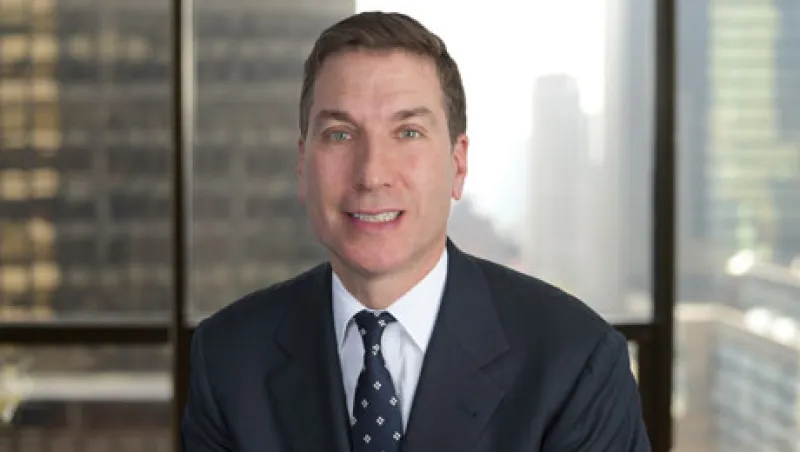Hanging on Paul Taubman’s office wall is an autographed photo of Roger Maris, the New York Yankees outfielder who in 1961 broke Babe Ruth’s record of 60 home runs. An avid Yankees fan, Taubman often takes clients and his four-year-old son to games. Now the founder, chair and CEO of PJT Partners is hoping to hit a home run with his new investment banking venture.
Last October, PJT debuted on the New York Stock Exchange as a 350-employee boutique firm that offers restructuring advice, fund placement and mergers and acquisitions advisory from offices in the U.S., Europe and Asia. Taubman hadn’t planned to return to the spotlight so quickly after calling time on a 30-year career at Morgan Stanley in 2012. “I saw it as an opportunity to step back,” recalls the 54-year-old New Yorker. “Then a bunch of clients started phoning me up.”
Taubman, whose duties at Morgan Stanley included running the firm’s global M&A franchise, found the lure of deal making too strong. Soon his name was appearing alongside his former employer’s in the global league table rankings as he played consigliere to long-standing clients, among them Verizon Communications on its $130 billion purchase of Vodafone’s 45 percent stake in Verizon Wireless in 2014.
Recruiting a handful of ex–Morgan Stanley executives, Taubman launched PJT in the summer of that year. Late in 2014 he got a call from Hamilton (Tony) James, president and COO of Blackstone Group, the world’s second-largest alternative-asset manager. A client from Taubman’s Morgan Stanley days, James invited him to meet Stephen Schwarzman, Blackstone’s chair and CEO. In the discussions that followed, Blackstone agreed to spin off its corporate finance and fund placement operations into Taubman’s start-up before PJT went public.
Last year PJT ranked 27th in global M&A deal volume, according to Dealogic, working on 28 transactions worth a collective $82 billion. That’s a big leap from its 49th-place finish in 2014, when it advised on 19 deals with a combined value of $20 billion.
With its IPO, PJT joins independent players such as Houlihan Lokey, Lazard and Moelis & Co., which are winning a greater share of M&A advisory work. “As big firms have become so large and complex, burdened with so much regulation, the importance of advice and relationships at those firms has been diminished,” Taubman says. “Clients want bankers who can deliver value-added advice, and they are increasingly working off a smaller platform.”
After earning an economics degree from the Wharton School of the University of Pennsylvania in 1982, Taubman joined Morgan Stanley’s analyst training program in the M&A department of the bank’s New York office. “I found I had a natural affinity for working with clients and loved the investment banking business,” he says. Taubman then embarked on an MBA at Stanford University’s Graduate School of Business and briefly tried another line of work, spending the summer of 1985 in London with L.E.K. Consulting,s an offshoot of Bain & Co. “I missed the pace of banking and noticed that in consulting the phone didn’t ring all day,” he remembers.
So upon leaving Stanford in 1986, he returned home to rejoin Morgan Stanley as an associate. Taubman, who helped to establish the bank as a leader in technology, media and telecommunications, was promoted to managing director in 1995, rose to global head of M&A in 2004 and became sole head a year later. He worked on the firm’s biggest M&A deals, advising AT&T Corp. on its $16.6 billion acquisition by SBC Communications in 2005 and Wyeth on its $68 billion sale to fellow U.S. pharmaceuticals giant Pfizer in 2009.
From 2007 to 2009, Taubman was global head of investment banking before becoming co-president of institutional securities, which included investment banking as well as sales and trading, until his departure in 2012. He’s quick to name the transaction he’s most proud of: In October 2008 he struck a $9 billion deal with Japanese bank Mitsubishi UFJ Financial Group to purchase 21 percent of Morgan Stanley, a move credited with saving the latter from collapse in the global financial crisis. “It’s a deal that sticks in my memory, and it’s great to see that partnership with MUFG thriving so well today,” he says.
Described by those who know him as an introvert and a good listener, Taubman has the knack for putting people at ease. “Paul imbues in his clients a sense of confidence in what they are doing,” notes David Stern, commissioner emeritus of the National Basketball Association and a senior adviser to PJT. Stern, who met Taubman in 1992 when the NBA retained Morgan Stanley to counsel it on expansion, says, “I was extremely impressed at the way he approached the task with intensity and intellectual rigor, qualities that he is applying as he builds a world-class investment bank.”
Since taking on the Blackstone operations, Taubman has closed some overseas offices and consolidated PJT’s international effort in London and Madrid, while beefing up the firm’s M&A capabilities by hiring senior talent. “We’ve brought people together to build a strong culture,” he says.
Besides indulging his passion for the Yankees, Taubman spends his off hours serving as president of New York Cares, a volunteer group that helps the underprivileged, and a trustee of Cold Spring Harbor Laboratory, a nonprofit research and education institute focused on molecular biology and genetics. But his schedule will be squeezed in the coming months. Announced global M&A deal volume hit an all-time high of $4.5 trillion in 2015, powered by record levels in the U.S., and Taubman thinks 2016 will be another strong year.
Then again, M&A activity could suffer if the collapse of oil prices, driven by concerns over a Chinese economic slowdown, shakes corporate confidence. Heightened fears of a downturn hit PJT’s stock price on its first day of trading — after closing at $21 on October 1, it had risen to about $24 in mid-January — but Taubman contends that his firm offers the right mix of services to weather the storm. “The volumes of outstanding corporate bonds globally are at record highs, and default rates are at historic lows,” he says. “Credit is tightening, and that is creating opportunities for our restructuring business.”
Get more on banking.






